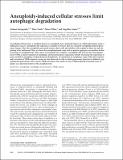| dc.contributor.author | Santaguida, Stefano | |
| dc.contributor.author | Vasile, Eliza | |
| dc.contributor.author | White, Eileen | |
| dc.contributor.author | Amon, Angelika B | |
| dc.date.accessioned | 2016-04-19T15:18:29Z | |
| dc.date.available | 2016-04-19T15:18:29Z | |
| dc.date.issued | 2015-09 | |
| dc.date.submitted | 2015-09 | |
| dc.identifier.issn | 0890-9369 | |
| dc.identifier.issn | 1549-5477 | |
| dc.identifier.uri | http://hdl.handle.net/1721.1/102257 | |
| dc.description.abstract | An unbalanced karyotype, a condition known as aneuploidy, has a profound impact on cellular physiology and is a hallmark of cancer. Aneuploid cells experience a number of stresses that are caused by aneuploidy-induced proteomic changes. How the aneuploidy-associated stresses affect cells and whether cells respond to them are only beginning to be understood. Here we show that autophagosomal cargo such as protein aggregates accumulate within lysosomes in aneuploid cells. This causes a lysosomal stress response. Aneuploid cells activate the transcription factor TFEB, a master regulator of autophagic and lysosomal gene expression, thereby increasing the expression of genes needed for autophagy-mediated protein degradation. Accumulation of autophagic cargo within the lysosome and activation of TFEB-responsive genes are also observed in cells in which proteasome function is inhibited, suggesting that proteotoxic stress causes TFEB activation. Our results reveal a TFEB-mediated lysosomal stress response as a universal feature of the aneuploid state. | en_US |
| dc.description.sponsorship | National Institutes of Health (U.S.) (GM056800) | en_US |
| dc.description.sponsorship | Kathy and Curt Marble Cancer Research Fund | en_US |
| dc.description.sponsorship | American Italian Cancer Foundation | en_US |
| dc.description.sponsorship | European Community. Marie-Curie Research Networks | en_US |
| dc.description.sponsorship | Italian Association for Cancer Research | en_US |
| dc.language.iso | en_US | |
| dc.publisher | Cold Spring Harbor Laboratory Press | en_US |
| dc.relation.isversionof | http://dx.doi.org/10.1101/gad.269118.115 | en_US |
| dc.rights | Creative Commons Attribution | en_US |
| dc.rights.uri | http://creativecommons.org/licenses/by-nc/4.0/ | en_US |
| dc.source | Cold Spring Harbor Laboratory Press | en_US |
| dc.title | Aneuploidy-induced cellular stresses limit autophagic degradation | en_US |
| dc.type | Article | en_US |
| dc.identifier.citation | Santaguida, Stefano, Eliza Vasile, Eileen White, and Angelika Amon. “Aneuploidy-Induced Cellular Stresses Limit Autophagic Degradation.” Genes Dev. 29, no. 19 (September 24, 2015): 2010–2021. | en_US |
| dc.contributor.department | Massachusetts Institute of Technology. Department of Biology | en_US |
| dc.contributor.department | Koch Institute for Integrative Cancer Research at MIT | en_US |
| dc.contributor.mitauthor | Santaguida, Stefano | en_US |
| dc.contributor.mitauthor | Vasile, Eliza | en_US |
| dc.contributor.mitauthor | Amon, Angelika B. | en_US |
| dc.relation.journal | Genes & Development | en_US |
| dc.eprint.version | Final published version | en_US |
| dc.type.uri | http://purl.org/eprint/type/JournalArticle | en_US |
| eprint.status | http://purl.org/eprint/status/PeerReviewed | en_US |
| dspace.orderedauthors | Santaguida, Stefano; Vasile, Eliza; White, Eileen; Amon, Angelika | en_US |
| dc.identifier.orcid | https://orcid.org/0000-0002-1501-6190 | |
| dc.identifier.orcid | https://orcid.org/0000-0001-9837-0314 | |
| mit.license | PUBLISHER_CC | en_US |
